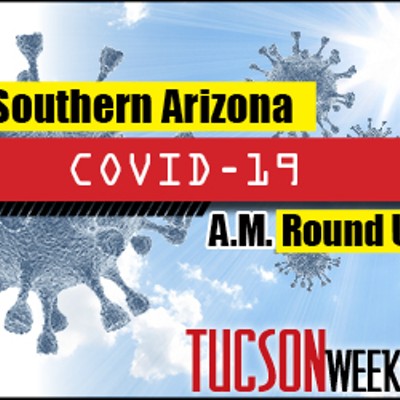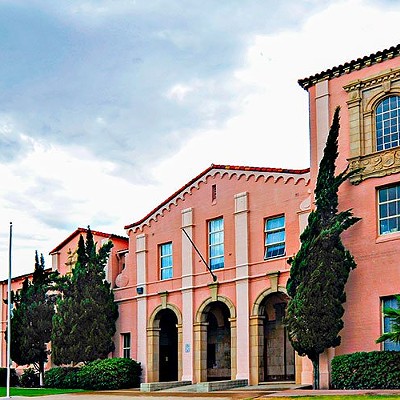The proposals, one for a $235 million bond program, and to that total seven years of new taxes will allow TUSD to exceed state-set spending limits by $217 million dollars.
Voters will be asked to approve the measures Nov. 2, backed by a consortium of developers, TUSD insiders and political heavy-hitters whose campaigns have already spent $74,145 through Sept. 27.
Requests for borrowing come after several years of declining enrollment in the Tucson Unified School District. Enrollment has dropped by several thousand to 61,346. The bond proposal includes one new elementary school and one additional middle school.
Parents excited to think that the proposal will mean new classrooms, smaller class sizes, air-conditioned buses and spiffed up athletic and drama facilities for their kids should heed the fact that the bond schedule is incomplete and could run 20 years.
TUSD officials and bond and override backers insist that the sprawling district can keep up with long overdue upgrades no other way. And promoters downplay the cost, even though the finance cost on the $235 million bond, under optimistic interest projections, is $160 million.
District taxpayers already owe $266.6 million in outstanding debt incurred by the TUSD board. The debt ceiling, set by a formula in the Arizona Constitution, is $749.4 million.
Lame-duck TUSD board member Mary Belle McCorkle, pushing the bond and override as her third term and tenure come to a close, told the Arizona Daily Star that the proposals will cost the average taxpayer the price of a pizza and pitcher of a soft drink each month.
They must eat expensive pizza at the McCorkle house, on the northern edge of TUSD on North Camino Gacela in the Catalina Foothills. The McCorkle home is more than double the $100,000 assessed value of the benchmark TUSD home. TUSD taxes at the $233,850 McCorkle home total $1,382 for both TUSD's daily operations and debt service. If approved, the bonds and overrides will add $388.51 to the McCorkle tax bill--that's $32.37 in pizza and Pepsi every month.
Promoters also have skimped on the details, issuing promises of broad construction programs rather than detailing what will be improved or built at specific schools. TUSD's information book sent to voters does a better job of breaking down construction plans and costs, but still leaves voters guessing which schools will get the makeovers and improvements.
For example, more than $20 million--before interest charges--is listed for "practice gyms at five district high schools and physical education facilities at district elementary and middle schools." Another $2.4 million is budgeted for the vague "purchase of land."
And it is the history of the TUSD board's high tax rates, bond spending and land purchases that could mean a difficult election even though promoters are banking on the same voter generosity that pushed overwhelming passage of Pima County's three-quarters-of-a-billion-dollar bond last May.
In a bitter effort nearly 12 years ago, TUSD board member Joel T. Ireland won, temporarily, approval to close Catalina High School at North Dodge Boulevard and East Pima Street. The vote violated TUSD's 1978 settlement agreement in the federal desegregation case, yet Ireland also won approval, also temporary, for construction of a high school on the southwest side.
Community revolt, action by Alfredo C. Marquez (the U.S. District Court judge then presiding over the desegregation case) and an attempted recall of Ireland reversed the decision. But not before TUSD paid an inflated price--several times what the land was offered earlier at auction--for property on the southwest side owned by 4-D Properties, the land company of the DeConcini family.
Though not directly involved in most of the company's local land transactions, U.S. Senator Dennis DeConcini, a Tucson Democrat now retired, was a beneficiary. Moreover, DeConcini's law firm--DeConcini, McDonald, Yetwin & Lacy--held and continues to hold a lucrative contract to represent TUSD, including on desegregation matters.
Ireland, a lawyer and Episcopal priest who is seeking a fifth unpaid term Nov. 2, consistently downplays TUSD's chronic high taxes. In 2001, as he pushed through a 14-percent tax increase for a budget that included TUSD job cuts, Ireland declared the increase a "fantasy tax."
It was, partly. Homeowners like Ireland, who pays $608 in TUSD taxes on his $110,000 home in the West University neighborhood, were protected by state law that caps the total taxes a homeowner pays for the daily operations of TUSD, Pima County and the city. Business, rental and vacant properties receive no such break.
TUSD taxes during Ireland's nearly 16 years on the board have increased 32 percent. More important, the levy--the amount TUSD can take from all taxpayers--has more than doubled from $98 million in 1989 to $202.7 million this year.
It is the type of increase that doesn't escape Chuck Josephson, who pays TUSD taxes not only on his home but on his East Broadway business, the Print Well. TUSD taxes on Josephson's home--valued for tax purposes at $123,661--are $681. On his business--valued at $142,000--TUSD taxes are $2,956. Business property is assessed at 2.5 times the ratio of owner-occupied homes. The bond and overrides will add $616 in TUSD taxes at Josephson's business.
Josephson has long monitored and complained about TUSD taxes and its desegregation budget, at $62.4 million this year on a total TUSD budget of $319 million. He also is Republican candidate for the State Senate in District 28, challenging Democratic incumbent Gabrielle Giffords.
"The district already has a 30 percent override with the desegregation budget," Josephson said. "It's plain unfair and indicates how badly this district is run."
He also faults Giffords and the legislature for not demanding that the state pay for TUSD construction via Students FIRST, approved by voters in 1998 to end inequities in school facilities by shifting responsibility to the state. The legislature, Josephson said, should force the Schools Facility Board to provide the necessary construction money to TUSD.
"TUSD does need southwest schools, but we agreed to have the state do it," Josephson said.
And the legislature, he added, also could push TUSD to split up into more manageable systems.Giffords did not return requests for a response.












